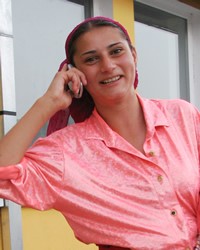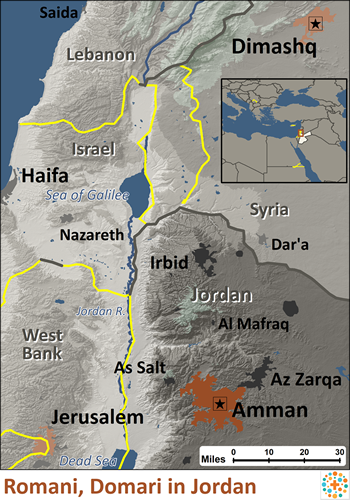Romani or Domari, comprise two groups: the Ghorbati and the Nawari. Both groups speak a dialect of the language called Romany, which is related to Punjabi and Rajasthani, both South Asian languages. Their dialect, Domari, contains many Arabic words. Romani speakers call themselves Rom, which in their language means "men." Rom is derived from the Indian word Dom, meaning "a man of low caste who gains his livelihood by singing and dancing." Romani speaking people originated in India where their ancestors worked as musicians, entertainers, and metal workers. They were discriminated against and excluded from Hindu temples. Later, they were sent to Persia as minstrels. From there, they were separated into two groups. One traveled northward and became the Romany-speaking European Romani. The other traveled southward and became known as the Domari, or Middle Eastern Romani. The latter group lives in Jordan and other countries in Central Asia and the Middle East.
A good number of the Romani in Jordan are refugees from Syria's civil war. They live in makeshift refugee camps without clean water or sanitation. They have to live by collecting recyclables, begging or working for a pittance on farms. The Jordanians look these people upon with disdain.
However, about 80 percent of them live in urban areas where they do the same kinds of work as the Jordanian majority. The urban Romani are trying to gain respect in Jordan, and they want new doors open to them, especially in the political realm.
Romani marriages usually take place between couples in their teens. Romani people consider sexual purity a must for young women. Before she is married, her family must be proof that she has never been with a man.
The Romani in Middle Eastern or Central Asian countries like Jordan are usually Muslim, and they follow the practices and beliefs of the Islamic faith. The traditional beliefs of the Romani such as that ghosts, lizards, and snakes can harm humans, that men have the power to curse others by giving them the "evil eye," and that some people have the power to heal the sick are no longer held by most Romani.
The quality of health care, nutrition, housing, and education is poor, especially those who live in refugee camps. Believers with the right skills could be a blessing to the Romani by providing some of these needs. Their nomadic lifestyle has made it difficult for workers to reach them. The Islamic religion is very difficult to influence. All they have are Bible portions in their language. Christian workers need to teach them how to live lives pleasing to God.
Pray for the Domari culture to be renewed and enhanced by a work of the Holy Spirit and shaped into a God-centered and God-honoring mold.
Pray for the Holy Spirit to move among Domari family and community leaders in Jordan to seek his face and enjoy his blessings.
Pray for the Lord to thrust out workers who will be compelled to nurture a movement to Christ among the Domari people in Jordan.
Pray that their dire conditions will soon lead the Domari to seek the One True God who yearns to give them the peace and joy of the Lord.
Scripture Prayers for the Romani, Domari in Jordan.
| Profile Source: Joshua Project |


























